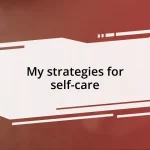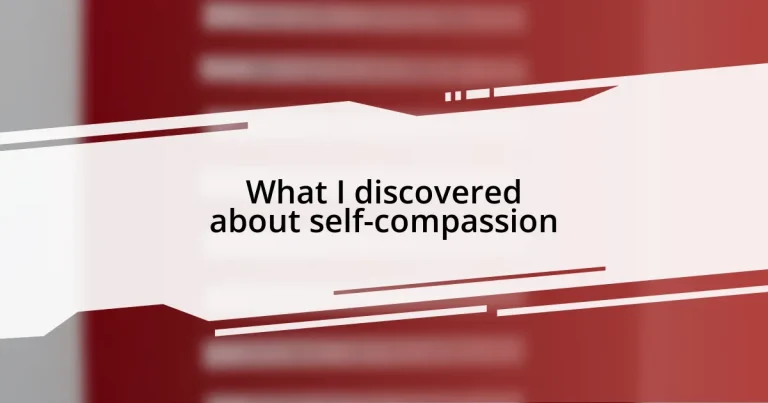Key takeaways:
- Self-compassion enhances emotional resilience, reduces anxiety and depression, and fosters healthier relationships by encouraging empathy for oneself and others.
- Recognizing self-judgment patterns is crucial for transforming negative self-talk into a more compassionate inner dialogue.
- Practical techniques like positive affirmations, mindfulness meditation, and journaling can effectively cultivate self-kindness and acceptance.
- Integrating self-compassion into daily life involves self-validation and prioritizing self-care, allowing individuals to acknowledge their feelings and needs without judgment.
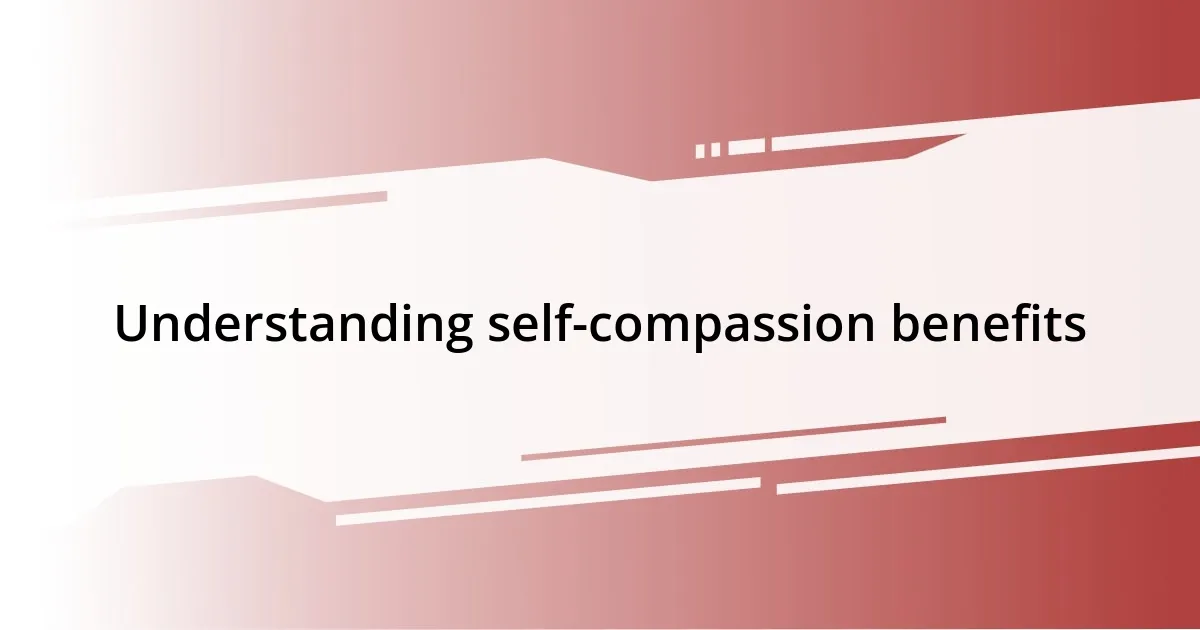
Understanding self-compassion benefits
One of the fascinating benefits of self-compassion is its profound effect on emotional resilience. I remember a particularly challenging period when I faced a major personal setback. Instead of beating myself up about it, I tried to respond with kindness, embracing the idea that everyone struggles. This simple shift in mindset allowed me to bounce back much more swiftly than I had anticipated.
Self-compassion also improves mental well-being by reducing feelings of anxiety and depression. I vividly recall a time when I was overwhelmed before a big presentation at work. Rather than letting self-doubt consume me, I practiced self-kindness, reminding myself that it was okay to feel nervous and that I was doing my best. This adjustment not only calmed my nerves but also fostered a sense of acceptance, allowing me to focus on performing rather than stressing about perfection.
Moreover, I find that cultivating self-compassion encourages healthier relationships, both with oneself and others. Have you ever noticed how being kind to yourself makes you more patient and understanding towards others? I did during a recent conflict with a friend. By recognizing my own humanity and flaws, I was better equipped to empathize with their perspective. It created an open space for communication and growth between us, ultimately strengthening our bond.
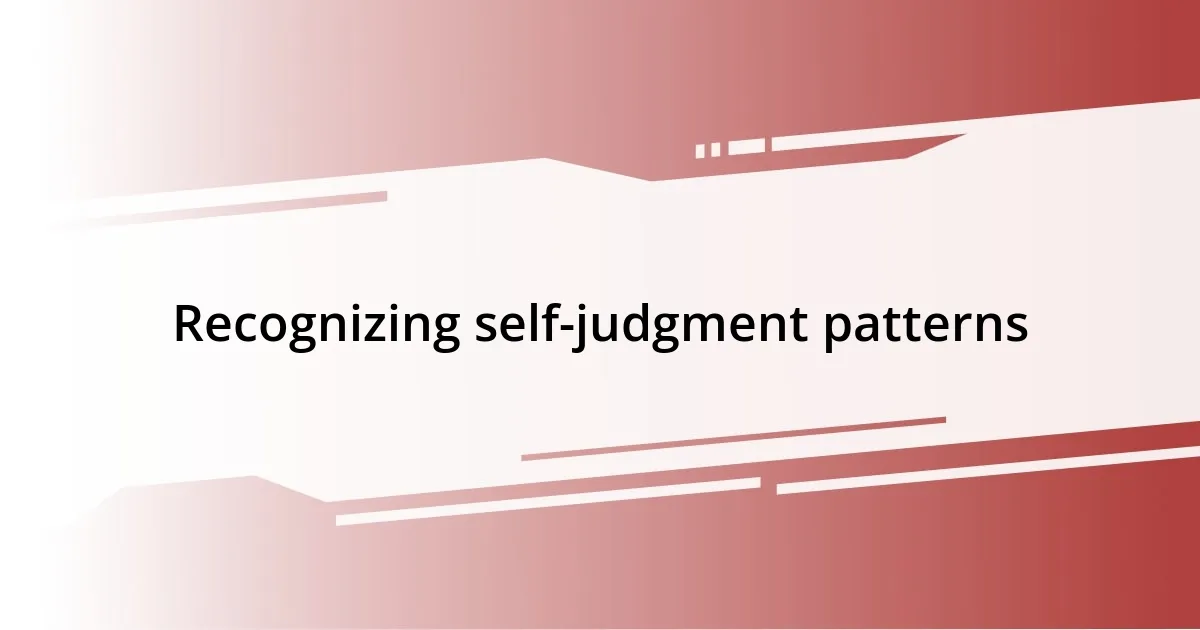
Recognizing self-judgment patterns
Recognizing self-judgment patterns can be the first step toward transforming your inner dialogue. When I began to pay attention to my thoughts, I noticed a recurring theme of harsh criticism, especially during difficult times. It struck me that this self-judgment was often automatic, like a knee-jerk reaction to perceived failures.
To help identify these patterns, I found it useful to reflect on moments when I felt inadequate or ashamed. Here are some signs that may indicate self-judgment:
- Frequent negative self-talk, often using phrases like “I’m not good enough” or “I always mess up.”
- A tendency to compare yourself unfavorably to others, feeling like you come up short.
- Resisting compliments or downplaying your achievements, as if you don’t truly deserve them.
- Feeling defensive or overly sensitive when receiving constructive feedback.
- Engaging in all-or-nothing thinking, where one mistake feels like a total failure.
Acknowledging these patterns allows us to challenge their validity and invite in a more compassionate perspective. I wish I had learned this sooner, as recognizing these judgments has been transformative in how I treat myself during struggles.
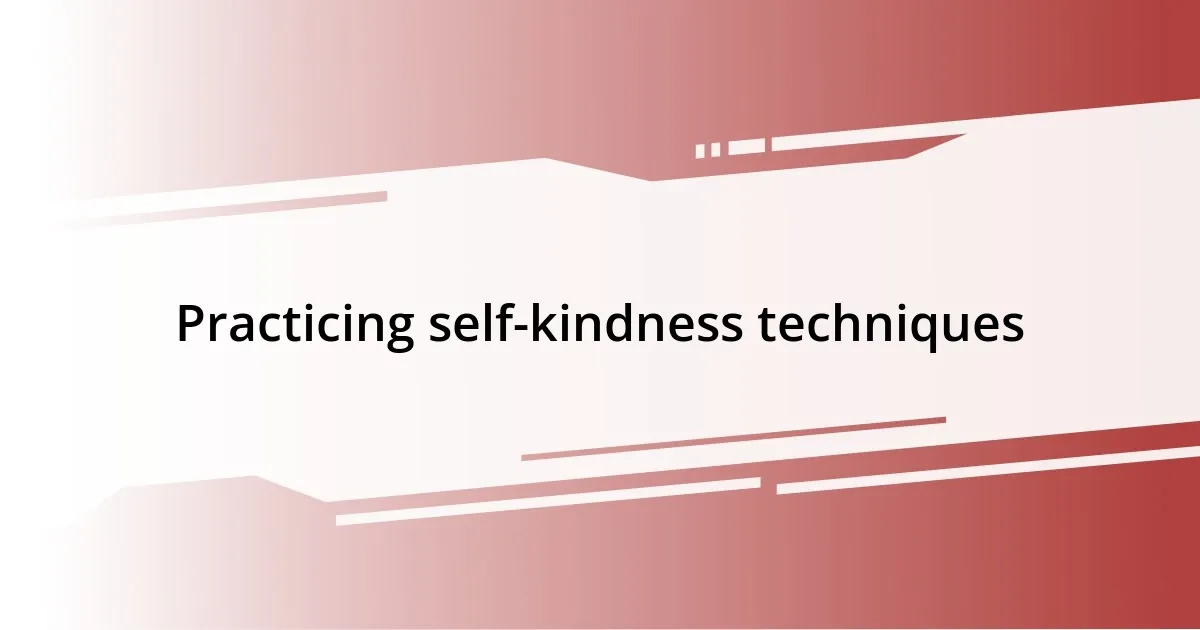
Practicing self-kindness techniques
One effective technique I discovered in practicing self-kindness is the power of positive affirmations. I’ve often found myself standing in front of the mirror, wrestling with self-doubt. Instead of letting those negative thoughts take hold, I started reciting affirmations like “I am enough” and “I deserve kindness.” Surprisingly, this practice shifted my mindset significantly, making me feel more resilient and accepting of my imperfections.
Another approach that has helped me greatly is mindfulness meditation. It seemed foreign at first, but I promised myself to keep an open mind. By dedicating even just a few minutes each day to sit quietly, observe my thoughts, and breathe deeply, I began to cultivate a space of non-judgment around my emotions. This practice helped me recognize feelings without criticism, allowing me to respond with gentleness instead.
Finally, I recommend journaling as a nurturing technique. Reflecting on my day and writing down moments of self-kindness is a practice I cherish. I make it a point to note my victories, however small, and the times when I showed compassion to myself. This act of appreciation deepens my self-acceptance and reinforces the idea that I deserve kindness just like anyone else.
| Technique | Description |
|---|---|
| Positive Affirmations | Reciting supportive phrases to challenge negative self-talk and enhance resilience. |
| Mindfulness Meditation | A practice of observing thoughts and feelings without judgment, fostering a gentle response. |
| Journaling | Writing down daily reflections to acknowledge moments of self-kindness and deepen self-acceptance. |
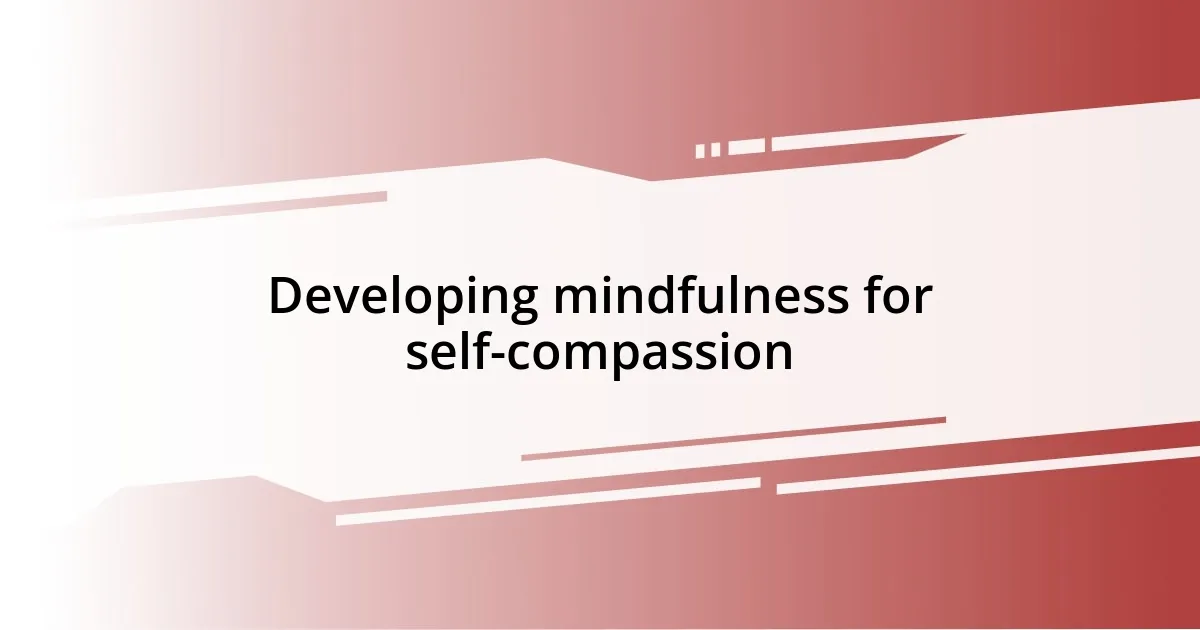
Developing mindfulness for self-compassion
As I embarked on my journey to develop mindfulness for self-compassion, I found that simply being present in the moment made a world of difference. It was during a particularly hectic week when I realized I was constantly rushing through my tasks, barely pausing to breathe or acknowledge my feelings. I started setting aside a few minutes each day to sit in silence, letting my thoughts flow without judgment, which slowly transformed my self-perception and allowed space for gentler feelings.
One day, while focusing on my breath, I caught myself daydreaming about a recent mistake. Instead of spiraling into self-criticism, I reminded myself: “So what if I stumbled? That’s part of being human.” This realization felt liberating. It’s amazing how a moment of mindfulness can shift your perspective from harsh judgment to acceptance. Isn’t it fascinating how we have the power to change the narrative in our minds?
Moreover, incorporating mindfulness into my daily routine has been a game-changer. Whenever I sense the familiar wave of self-doubt crashing over me, I pause and take a few deep breaths. These small acts foster a sense of calm, allowing me to react to my thoughts and feelings with compassion rather than criticism. I cherish these moments, as they remind me that I deserve understanding just like anyone else, and they lay the groundwork for deeper self-acceptance.
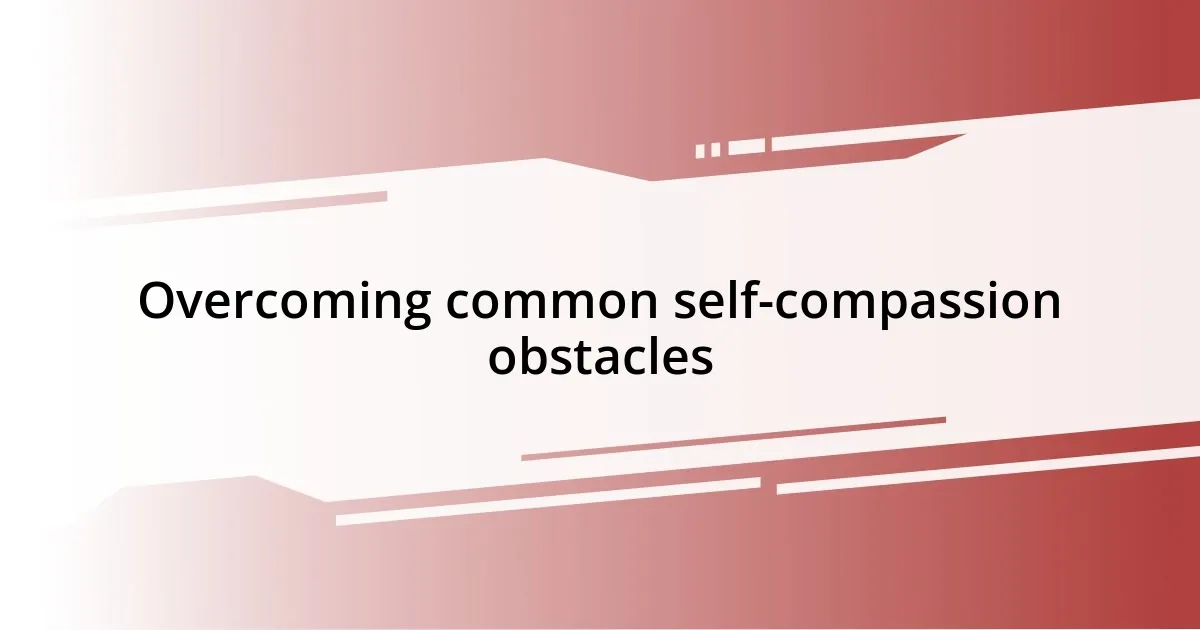
Overcoming common self-compassion obstacles
It’s not uncommon to encounter obstacles on the road to self-compassion. One hurdle I faced was the nagging fear that being kind to myself would lead to complacency. I often wondered, “What if I become too soft on myself and stop striving for growth?” However, I realized that self-compassion isn’t about letting oneself off the hook; it’s about recognizing my struggles while also pushing to improve. Once I shifted my mindset, I found it much easier to treat myself with the same kindness I offer others.
Another challenge was the deeply ingrained belief that I didn’t deserve compassion. Growing up, I was conditioned to think that I had to earn kindness through achievements or behavior. It took time, but I had that lightbulb moment when I asked myself, “What if I already deserve this kindness simply because I exist?” In embracing this idea, I discovered that self-compassion isn’t a reward; rather, it’s an essential aspect of being human that fosters resilience and can motivate me to achieve my best.
One practical tip I adopted for overcoming these obstacles was creating a self-compassion mantra. Each morning, I began repeating the phrase “I am worthy of love and kindness” quietly to myself. At first, it felt awkward, almost like I was trying to convince a skeptic, but gradually, those words sank in. It amazes me how powerful a simple affirmation can be in dismantling the barriers I had built around my self-worth. Have you ever tried something similar? It could be just the boost to overcoming your own self-compassion challenges.
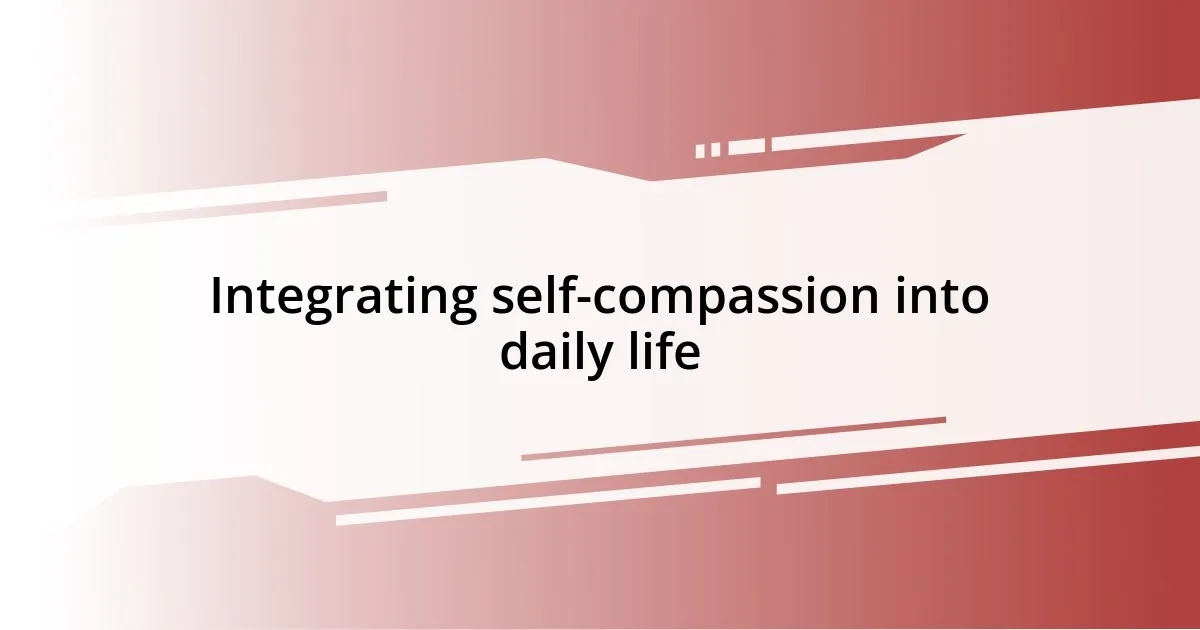
Integrating self-compassion into daily life
Integrating self-compassion into daily life can be surprisingly simple yet profound. One evening, after a particularly taxing day, I noticed I was about to berate myself for not finishing my to-do list. Instead, I paused and thought, “How would I speak to a friend in this moment?” This shift in perspective helped me acknowledge my limitations without judgment, allowing me to treat myself with the same kindness I’d extend to someone I care about. Can you remember a time when you showed kindness to yourself, even when it felt undeserved?
Another important aspect of integrating self-compassion is the practice of self-validation. I discovered that simply acknowledging my feelings can be a powerful act of compassion. For instance, when I felt overwhelmed about a project, instead of dismissing my fear or shame, I would say, “It’s okay to feel this way; it means you care.” This tiny acknowledgment not only eased my stress but also fostered a deeper relationship with myself. Have you ever stopped to validate your emotions instead of pushing them aside? It’s a game-changer.
Building self-compassion into my daily routine also means prioritizing self-care rituals. I’ve found that designating time for activities that nourish my spirit makes a significant difference. Whether it’s enjoying a leisurely walk in nature or indulging in a good book, these moments reinforce the idea that I am worthy of care. When I make self-care a priority, I remind myself that I deserve joy and peace, not just productivity. What small actions can you incorporate into your life that honor your need for compassion?
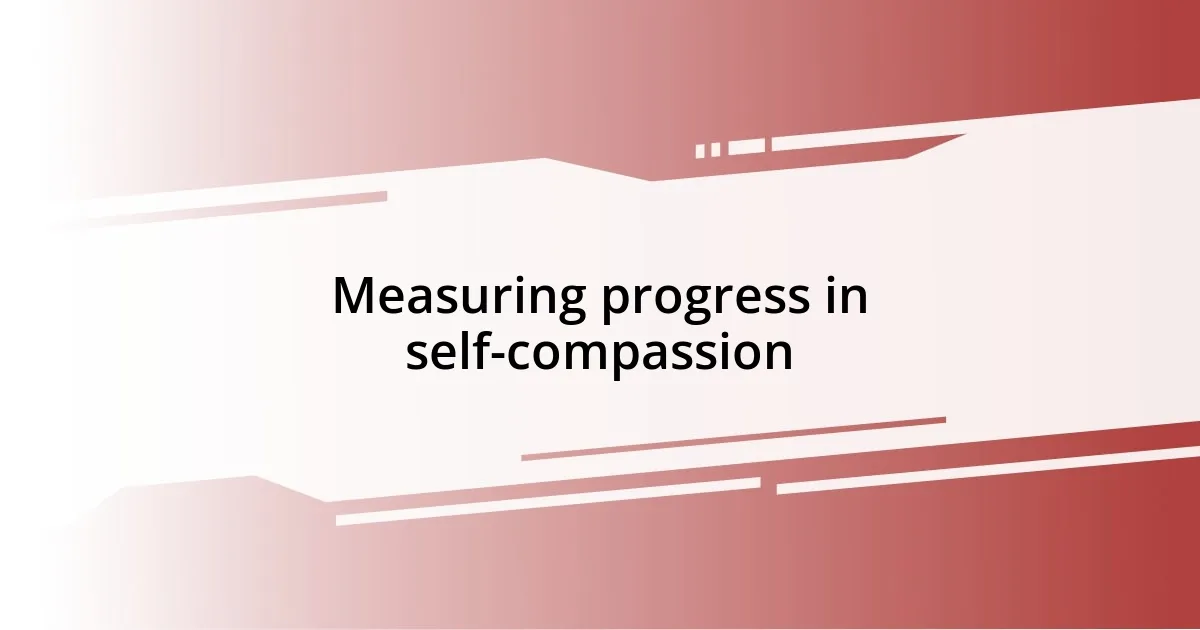
Measuring progress in self-compassion
Measuring progress in self-compassion can feel like navigating uncharted waters. Early on, I used to think progress meant having a constant flow of positive feelings toward myself. However, I learned that it’s not always about feeling good; it’s about recognizing those moments when I treat myself with understanding, even in the midst of emotional turmoil. But how do you gauge growth in something that feels so inherently personal?
One method that resonated with me was keeping a self-compassion journal. I started jotting down instances where I showed myself kindness, whether it was forgiving myself for a mistake or simply acknowledging my feelings without judgment. At first, it seemed trivial, but over time, I was amazed at how these entries highlighted my growth. Have you ever paused to reflect on the small victories you experience? It’s like holding a mirror to your journey, showing you just how far you’ve come.
I also found it helpful to track my emotional responses during challenging situations. Instead of spiraling into self-criticism, I began noting my reactions and how I eventually calmed myself down through compassionate self-talk. Understanding these patterns provided me with valuable insights. It’s a bit like spotting trends in your behavior; what do you notice when you reflect on your emotional evolution? Embracing this practice has made measuring my progress in self-compassion an enlightening experience.






